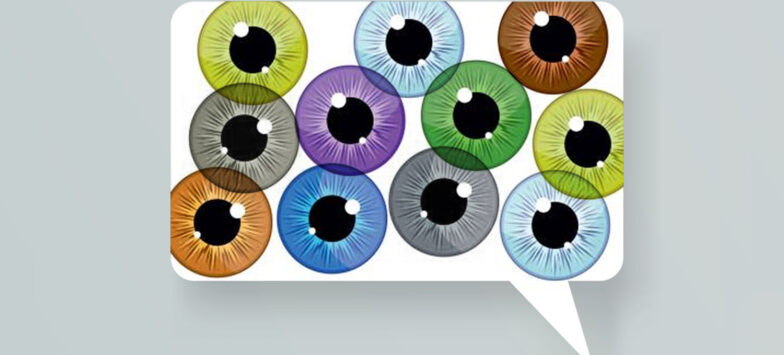
What Does Your Eye Color Say About You?
Whether brown, blue, green, or somewhere in-between, our eye color is as individual as we are. You may be surprised to hear that research has found some associations between eye color and greater (or lesser) risk for certain health problems. Though eye color alone is not diagnostic, it may signal some health areas of possible concern to keep in mind.
How do eyes get their color in the first place?
According to the American Academy of Ophthalmology, brown eyes get their color from melanin, the same pigment that colors your skin. Blue eyes don’t have any pigment in them. They get their color the same way water and the sky get their blue color, by scattering light so that more blue light reflects back out.
The colored part of the eye is called the iris. The iris is made up of two layers. For almost everyone — even people with blue eyes — the back layer (called the pigment epithelium) has brown pigment in it. For people with green or hazel eyes, one or both of the layers of the iris contains light brown pigment. The light brown pigment interacts with the blue light and the eye can look green or speckled.
Is There an Eye Color – Health Connection?
Though your eye color doesn’t mean you will get a particular health problem, be aware that there are some correlations for eye and overall health that turn up in the general population:
• Light Sensitivity – Less eye pigment means people with blue or light green eyes will be more sensitive to light. The sun will be brighter for you, so make sure you go out with good sunglasses that block 100% of UVA and UVB rays.
• Cataracts – Having brown, black, or darker eyes doesn’t mean you can disregard wearing sunglasses, because you have a higher risk for cataracts. So get those cool shades and wear them!
• AMD – Age-related Macular Degeneration comes to all of us with age, but it may happen a bit earlier for people with blue and light green eyes. Your Atlantic Eye ophthalmologist can advise all patients on prevention strategies to help delay this vision-stealer. And yes, sunglasses are helpful here, too!
• Some Cancers – If you have blue or light green eyes, you’re probably more susceptible to skin cancers. Darker-eyed people may have a bit lower risk, but we should all take precautions against sun damage and monitor any skin changes carefully.
• Vitiligo – The primary characteristic of vitiligo is blotches of discolored skin. There are treatments, but unfortunately no cure. If you have brown or dark eyes, be aware that you’re more likely to deal with vitiligo than others.
• Alcohol Abuse – Blue and other light-colored eye types may have a greater risk for alcoholism. This may be because dark-eyed people have a lower tolerance for alcohol and therefore drink less, but no one knows for sure.
• Pain tolerance – A study with pregnant women found that lighter-eyed women had better pain tolerance than those with darker eyes. It was a small study with a limited population, but it could lead to further research.
Whatever your eye color, the most prudent policy to keep yourself and your vision healthy is to schedule a comprehensive eye exam with and Atlantic Eye ophthalmologist. Contact us today!
